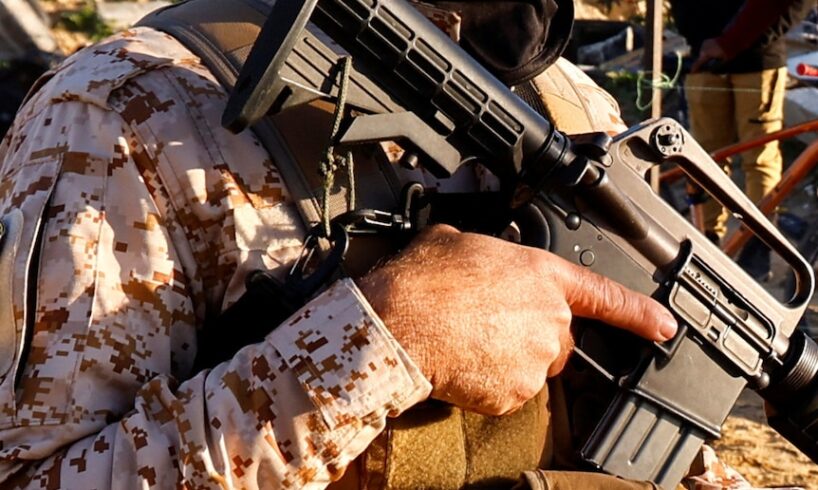
When the Palestinian militant group Hamas began planning the attacks on Israel that would shock the world on October 7, 2023, it called the coming assault the beginning of a religious war, a so-called “final promise” for the “full liberation of Palestine from the sea to the river”.
Since it decided to launch its “Al Aqsa Flood” operation, Hamas has lost its most senior leaders, its military organisation and infrastructure and most of its governing capacity for the Gaza Strip.
The group, whose name means “Islamic Resistance Movement”, has gone from dominating Gaza and having access and influence around the Middle East to being targeted in the safest allied capitals, such as Tehran, and now even Doha.
It has been pursued relentlessly inside the Gaza Strip, where its former strongholds have been turned into wastelands by Israeli bombs and bulldozers.
Destruction in North Gaza, as seen from Israel’s border with Gaza on August 12, 2025. (Reuters: Ammar Awad)
However, Hamas has nevertheless managed to hang on to the remaining Israeli hostages, preserve some capacity to keep fighting Israeli troops, recruit new members and remain the dominant force inside Gaza.
“There’s nothing left of the political institutions that Hamas once ruled before the Gaza war,” Erik Skare, a researcher and historian at Oslo University who studies Hamas, told the ABC.
“So there is no traditional political control in Gaza, but it does exert de facto control in the sense that it still has a military and political presence.
“We do know that it exerts influence on the civilian population in Gaza, such as when there was discontent and protests against Hamas and the devastation of the Gaza, we do know that Hamas sent thugs to beat up and even kill some of the protesters.
“When it comes to the military control, then Hamas still exerts its influence heavily. It is by no means defeated. It is heavily present, and it is also engaging in daily attacks against Israeli troops in what could best be described as a harassment campaign against Israeli targets.”
Israel on Tuesday carried out an attack in Qatar’s capital Doha, saying it was targeting Hamas’s top leadership. Hamas later said they survived the strike but five of its members were killed.
Why would Qatar give Trump’s words any credence?
While the full impact of the Qatar attack is still unclear, the political and military leadership of the group had already been decimated by Israeli strikes and assassinations.
Israel is presumed to have killed the chairman of the Hamas political bureau in Tehran last year, while it killed the group’s Gaza leader, Yahya Sinwar, in southern Gaza in October.
The killing of Hamas’s top ranks leaves Izz al-Din al-Haddad, a reported hardliner who favours continuing the war, as the surviving military commander in Gaza.
Al-Haddad has warned Hamas fighters the upcoming battle for Gaza City “could last for months,” promising Hamas was mobilising to deliver “severe blows” to Israeli troops.
Izz al-Din al-Haddad is the surviving military commander in Gaza and has gone deep underground (Screengrab/Hamas)
Hamas previously had a formal military, with a command structure and organisation known as an “order of battle”.
Israel’s campaign has destroyed that, Dr Skare said, leaving it fighting an insurgency rather than a formal military campaign.
“It has gone from the traditional chain of command to working with autonomous military cells that operate clandestinely and also in solitary, it does not depend on the higher military echelon to execute attacks,” Dr Skare said.
There is data showing this has coincided with a steady decrease in the number of operations Hamas carries out against Israeli troops, Dr Skare said. In October 2023 the group was averaging 40 operations a week. It’s now averaging 10 to 15.
“There are many ways to interpret that decline,” Dr Skare said.
“One thing it could be that Hamas is, in fact, militarily weakened. It could be also that Hamas is adapting to the urban guerilla warfare.
“We see that the main types of attacks that Hamas are carrying out are ambushes … they go quickly in and then quickly withdraw to minimise casualties in their own ranks.”
The number of fighters left in Hamas is unknown, although recent reporting by Israeli magazine +972 said the Israel Defense Forces’s own intelligence database shows it has killed about 8,900 members of Hamas and rival group Palestinian Islamic Jihad, out of 47,653 active members, far fewer militants than the military has publicly claimed have been killed.
Hamas may emerge with greater influence
Observers said the group has also been actively recruiting from the immiserated Gaza population, which has plenty of fresh, strong grievances against Israel.
History suggests there is no certainty Israel’s targeting of senior leaders will cripple Hamas in the long term.
The group has recovered from multiple Israeli assassination campaigns before, including the killing of its spiritual leader, Sheikh Ahmed Yassin, and previous senior leaders.
The disabled refugee who founded Hamas
Mkhaimar Abusada, formerly an associate professor of political science at Gaza’s Al-Azhar University, said while Hamas is now in a “very difficult situation,” it would not have struggled to replace senior Hamas leaders had they been killed in the attack.
“It happened to Hamas in 2003, 2004, after Israel killed five of their top senior leaders … Hamas succeeded in replacing them,” he told the ABC.
Israeli commentators have suggested this could also empower Hamas leaders in the West Bank, where the group has always been at a disadvantage against both Israeli and Palestinian opposition.
“Decisions within Hamas are made collectively, with input from other power centres such as the leadership in the West Bank and imprisoned members held in Israel. Ironically, the group’s West Bank leadership — largely untargeted by Israel during this war — may emerge with greater influence,” veteran Israeli military correspondent Amos Harel wrote in the newspaper Haaretz.
Former Israeli security chiefs and military leaders have questioned the effectiveness of the country’s assassination strategy, saying it makes it more difficult to reach diplomatic and political resolutions to the conflict.
Many analysts argue that was the point, allowing Israel to claim it was open to negotiated settlements while making them practically impossible.
Three assassinations later, how has Israel targeted its enemies?
Hannah Alshaikh, the Palestine Project Coordinator at the Arab Centre DC, said Israel has done this multiple times.
“In 2012, Israel launched another war on Gaza after assassinating Ahmad al-Jabari, who had led negotiations the previous year that resulted in the exchange of Israeli soldier Gilad Shalit for 1,000 Palestinian prisoners,” she said.
“In 2014, two months after Palestinian Authority President Mahmoud Abbas announced a National Unity Government as a result of Hamas-Fatah national reconciliation talks, Israel launched a brutal 51-day war on Gaza to thwart the national unity government and divide Palestinian politics, thereby sidestepping international pressure to negotiate with a unified Palestinian front.”
The assassinations also often have unintended consequences.
Israel’s killing of Sheikh Yassin removed his restrictions on Hamas accepting full patronage from Iran, leading the group to get extensive new funding and training.
But the Israeli government and some Israeli commentators argue that attacking the external Hamas leadership in Qatar could in fact make it easier to strike a deal with the group.
“It might be the case … that this would endanger more the negotiation, but it might also be the case that now there’ll be one voice and one partner, one side to negotiate with, which is in Gaza,” Amos Nadan, the director of the Moshe Dayan Center for Middle Eastern and African Studies at Tel Aviv University, told the ABC.
“Because at the end of the day, those who keep the hostages are not in Qatar, they are in Gaza. So this is about not only targeting the leadership that is in Qatar, but sending a message to the other Hamas officials who are still in Gaza that they need to properly negotiate here.”
Displaced Palestinians shelter in a tent camp in Mawasi area, designated by Israel as a humanitarian zone. (Reuters: Ramadan Abed)
The effect of the Qatar attack could also hinge on how many of the Hamas leaders were killed and which survived, Professor Nadan said.
“If eventually, we’ll see that many people were killed in that attack, leaders like (Khalil al) Hayya and others, in fact, Israel would be able to say, ‘OK, we won against Hamas, now we are ready to negotiate,'” he said.
But most other observers believe this strike will end any chance of reaching a ceasefire.
“The strike makes a hostage deal less likely,” former US negotiator Brett McGurk, who was part of the Biden administration’s efforts to secure an agreement, wrote on CNN.
“The only way to return the remaining hostages safely is through a negotiated deal.
“Negotiating a deal requires negotiating with the Hamas leadership in Doha and through those leaders with the militant leaders inside Gaza.
“There is no other way to do it.”
Israel has literally blown up the Gaza ceasefire negotiations
Israel has also repeatedly said that Hamas, which was democratically elected as the Palestinian government in the last parliamentary elections in 2006, must be destroyed and can have no role in the future governance of Gaza or the West Bank.
Arab nations agreed for the first time earlier this year, signing a joint declaration stating Hamas must disarm and relinquish power in Gaza.
But because that initiative also involved increased international backing for the Palestinian Authority to govern the West Bank and Gaza and progress towards an independent Palestinian state, Israel did not support the plan.
Throughout the Gaza war, multiple observers have said that the despite the group’s setbacks, the idea of destroying Hamas or removing it entirely from Palestinian politics is a fantasy.
“I think it’s completely unrealistic to envision any future in Palestinian political society without Hamas,” Dr Skare said.
“Although discontent with Hamas is growing in the Gaza Strip, and although its support is declining, we do not see an equivalent increase in support for any of (the alternative) factions
“Now, whether that role of Hamas in future Palestinian political society will be as a completely legal, nonviolent political movement, or whether it will be as a clandestine armed movement or whatever shape it will take, it’s clear that Hamas is here to stay.”





